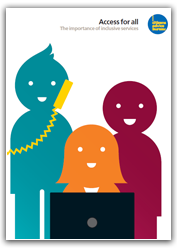Access for all

Executive summary
The internet revolution means that products and services are increasingly offered to, and used by, the public online. Yet there are seven million UK households without internet access, and there will always be people who need to access goods and services through other channels – particularly face-to-face support.
There are sound moral, legal and business reasons why providers should make sure that their services and products are equally available to all users and potential users.
Morally, a civilised society should ensure that no one is disadvantaged by barriers which prevent them from accessing services available to the general public.
Legally, the Equality Act 2010, and the Consumer Protection from Unfair Trading Regulations 2008 (CPRs) require certain duties from providers, who are breaking the law if they do not comply.
In business terms, inclusive provision increases the potential market for goods and services, improves customer satisfaction and ultimately reduces the cost.
Many organisations are beginning to address the issue of how to provide inclusive access to goods and services. A common starting point is to list potential risk factors – such as a medical condition, or personal circumstances – which might lead to disadvantage or vulnerability. Other organisations recognise that vulnerability can be a dynamic and changing state, which may be caused by the failure of systems and procedures to accommodate the needs of all individuals. We suggest that vulnerability should be identified through understanding risk factors, awareness of behavioural triggers, and a recognition of the potential barriers caused by existing systems.
Providers should be alert to signs of vulnerability, which may include: explicit disclosure of problems; obvious signs or information when the user engages with the provider; hidden signs which may need time and encouragement to discover; and changes in behaviour over time.
In this report, Citizens Advice advocates a proactive and anticipatory approach, in which equality and inclusivity are integral to the design of service provision; where systems are in place to identify vulnerable users; and where follow-up procedures are robustly applied to give the best service to the individual. These processes must be fully understood and implemented by all staff from the executive to the frontline.

